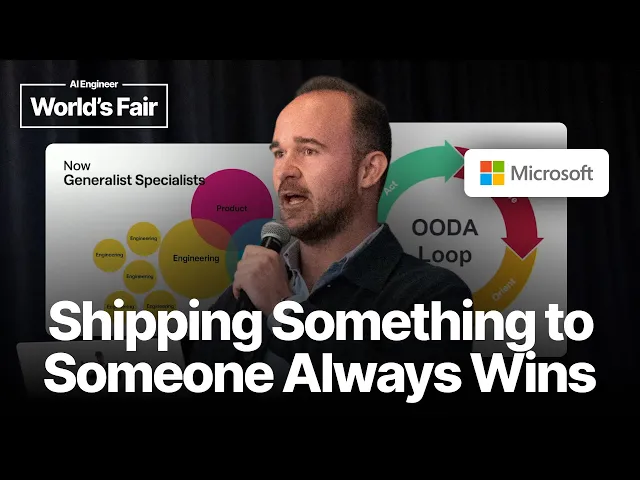Shipping something to someone always wins — Kenneth Auchenberg (ex. Stripe, VSCode)

Getting started beats getting perfect
In a landscape littered with stalled projects and perpetual beta releases, Kenneth Auchenberg's insights on shipping products cut through the noise with refreshing clarity. The former Stripe and VSCode leader delivers a masterclass on why execution trumps perfection in the modern tech ecosystem. His perspective challenges the common paralysis that afflicts product teams who obsessively polish features while competitors race ahead with functional—if imperfect—solutions.
Key elements of Auchenberg's shipping philosophy
-
Ship to learn: Auchenberg emphasizes that real-world feedback from actual users provides infinitely more valuable insights than theoretical discussions or internal debates. The act of shipping creates a feedback loop that drives meaningful iteration.
-
Imperfect beats non-existent: Products that reach users, even with rough edges, create more value than polished concepts that never see the light of day. The "last 20%" of perfection often consumes disproportionate resources while delaying real value delivery.
-
External validation accelerates growth: When teams expose their work to customers, they gain critical validation that either confirms their direction or signals the need for course correction—something impossible to achieve while a product remains within company walls.
Why shipping velocity matters more than ever
The most compelling takeaway from Auchenberg's perspective is his assertion that shipping cadence fundamentally shapes organizational culture. Companies that regularly deliver working products to customers develop a distinctly different mindset than those stuck in endless refinement cycles. This shipping-oriented culture breeds confidence, resilience, and a practical understanding of market needs.
This insight matters tremendously in today's competitive environment where market windows close rapidly. The pandemic accelerated digital adoption across industries, but it also heightened user expectations for continuous improvement. Organizations that master rapid, iterative shipping can respond to these shifting demands, while those mired in perfectionism risk becoming irrelevant before ever launching.
Beyond Auchenberg: The hidden costs of not shipping
What Auchenberg doesn't explicitly address is the psychological toll that non-shipping takes on product teams. Research from organizational psychology suggests that teams who regularly ship experience higher job satisfaction and reduced burnout. A 2021 McKinsey study found that product teams who delivered incremental value at least bi-weekly reported 37% higher engagement scores than those with
Recent Videos
How To Earn MONEY With Images (No Bullsh*t)
Smart earnings from your image collection In today's digital economy, passive income streams have become increasingly accessible to creators with various skill sets. A recent YouTube video cuts through the hype to explore legitimate ways photographers, designers, and even casual smartphone users can monetize their image collections. The strategies outlined don't rely on unrealistic promises or complicated schemes—instead, they focus on established marketplaces with proven revenue potential for image creators. Key Points Stock photography platforms like Shutterstock, Adobe Stock, and Getty Images remain viable income sources when you understand their specific requirements and optimize your submissions accordingly. Specialized marketplaces focusing...
Oct 3, 2025New SHAPE SHIFTING AI Robot Is Freaking People Out
Liquid robots will change everything In the quiet labs of Carnegie Mellon University, scientists have created something that feels plucked from science fiction—a magnetic slime robot that can transform between liquid and solid states, slipping through tight spaces before reassembling on the other side. This technology, showcased in a recent YouTube video, represents a significant leap beyond traditional robotics into a realm where machines mimic not just animal movements, but their fundamental physical properties. While the internet might be buzzing with dystopian concerns about "shape-shifting terminators," the reality offers far more promising applications that could revolutionize medicine, rescue operations, and...
Oct 3, 2025How To Do Homeless AI Tiktok Trend (Tiktok Homeless AI Tutorial)
AI homeless trend raises ethical concerns In an era where social media trends evolve faster than we can comprehend them, TikTok's "homeless AI" trend has sparked both creative engagement and serious ethical questions. The trend, which involves using AI to transform ordinary photos into images depicting homelessness, has rapidly gained traction across the platform, with creators eagerly jumping on board to showcase their digital transformations. While the technical process is relatively straightforward, the implications of digitally "becoming homeless" for entertainment deserve careful consideration. The video tutorial provides a step-by-step guide on creating these AI-generated images, explaining how users can transform...
